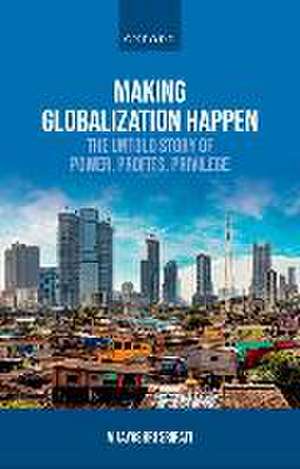Making Globalization Happen: The Untold Story of Power, Profits, Privilege
Autor Vijayashri Sripatien Limba Engleză Hardback – 15 apr 2024
Preț: 777.85 lei
Preț vechi: 1115.31 lei
-30% Nou
Puncte Express: 1167
Preț estimativ în valută:
148.86€ • 154.84$ • 122.89£
148.86€ • 154.84$ • 122.89£
Carte tipărită la comandă
Livrare economică 03-09 aprilie
Preluare comenzi: 021 569.72.76
Specificații
ISBN-13: 9780198903154
ISBN-10: 0198903154
Pagini: 568
Dimensiuni: 140 x 216 x 35 mm
Greutate: 0.75 kg
Editura: OUP OXFORD
Colecția OUP Oxford
Locul publicării:Oxford, United Kingdom
ISBN-10: 0198903154
Pagini: 568
Dimensiuni: 140 x 216 x 35 mm
Greutate: 0.75 kg
Editura: OUP OXFORD
Colecția OUP Oxford
Locul publicării:Oxford, United Kingdom
Recenzii
Vijayashri Sripati offers an original and important analysis of the UN and international institutions' role in Making Globalization Happen, placing constitution-making and reform at the centre of the analysis. This work makes an important contribution to our understanding and, most importantly, takes a non-Western perspective. It provides a detailed view of the hidden history and practices of globalization as a social, economic, and political process that was consciously enabled via the practices of international constitutionalization.
This is the first volume to knit the concepts of globalization and constitutionalism and to suggest a deep affinity between global economic constitutionalism and Third World constitutionalism. It is a richly provocative work. The criticism about TWAIL is justified; the proposed change into TWAIL-CL (TWAIL and international constitutional law) is highly original and thought-provoking. This is an inaugural work in this area.
Combining the terms rule of law and global capitalism seems sensible, even constructive, in parts of the world. In others, especially in former colonies, the combination can suggest continuing oppression and deepening dependency. Critical legal scholar Vijayashri Sripati explains why the latter response persists. She explores the constitutive global forces that animate law and politics in countries where most of the world's population resides. Her approach is analytical as well as polemical and intends to spark important debates.
Explores the origins and consequences of globalization, promoting the argument that the United Nations (UN) and Bretton Woods Institutions politically and economically reorganized sovereign third world states into a global network in order to benefit transnational capitalists. Analyzes the reasons economic globalization was implemented, describing how policies that created conflict in the 1980s were recycled to prevent conflict in 1999. Highlights the role played by the exportation of liberal constitutionalism in the development of globalization.
This is the first volume to knit the concepts of globalization and constitutionalism and to suggest a deep affinity between global economic constitutionalism and Third World constitutionalism. It is a richly provocative work. The criticism about TWAIL is justified; the proposed change into TWAIL-CL (TWAIL and international constitutional law) is highly original and thought-provoking. This is an inaugural work in this area.
Combining the terms rule of law and global capitalism seems sensible, even constructive, in parts of the world. In others, especially in former colonies, the combination can suggest continuing oppression and deepening dependency. Critical legal scholar Vijayashri Sripati explains why the latter response persists. She explores the constitutive global forces that animate law and politics in countries where most of the world's population resides. Her approach is analytical as well as polemical and intends to spark important debates.
Explores the origins and consequences of globalization, promoting the argument that the United Nations (UN) and Bretton Woods Institutions politically and economically reorganized sovereign third world states into a global network in order to benefit transnational capitalists. Analyzes the reasons economic globalization was implemented, describing how policies that created conflict in the 1980s were recycled to prevent conflict in 1999. Highlights the role played by the exportation of liberal constitutionalism in the development of globalization.
Notă biografică
Vijayashri Sripati has served as a visiting scholar at the Trafficking and Social Justice Institute in the College of Health and Human Services at the University of Toledo, Ohio (2019-2023). Her work intersects three disciplines that developed in parallel during the 1990s: Western constitutional law, public international law, and international political economy. Sripati's Constitution-Making Under UN Auspices: Fostering Dependency in Sovereign Lands (OUP, 2020) and Making Globalization Happen: An Untold Story of Power, Profits, Privilege (OUP, 2024) have shown that, since the mid-1980s, the UN family has co-promoted the classical liberal constitution, engendering two concurrent but new disciplines: global studies and international constitutional law/constitutional political economy. By providing the parental or constitutional foundation for these disciplines, Sripati's work elaborates upon what drives global politico-economic governance: the international constitutional order.
